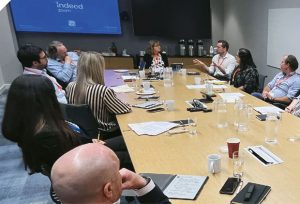OVERCOMING AI BARRIERS
We discussed overcoming ‘laggard’ attitudes towards adopting AI and any new technologies in FM – where rather than looking at what technical innovations can offer, means believing they’ve done it their way successfully for so long there’s no need for change. This attitude isn’t confined to individuals; many FM businesses are fearful of pioneering AI – instead taking a wait and see approach.
Another issue is that AI is moving so fast it makes some employers reluctant to invest in platforms believing that by the time they’ve trained people up, it’s moved on. Yet, as our AI expert explained: “When you really learn how to harness these tools, you’ll get the best out of them.”
There were also discussions regarding educating end users, both hirers and temporary staff in using the platforms. There is a wide demographic of flexible workers, ranging from tech savvy Gen Z to those who may be semi-retired but want to stay within the workforce. A panellist noted: “Many of these older people don’t have a LinkedIn profile, so trying to find them is difficult, yet they offer fantastic value to the workforce, because they bring so much experience and wisdom. If they’re getting left behind due to technology we’re going to miss out.”
Fitzer advised that how to overcome this is by “Employers better educating their talent managers on the correct use of AI technology because if we are going to utilise tech to help with recruitment, we must all know how to use it”.
This brought us to the topic of training and skills for both incoming and incumbent staff. A delegate shared that their induction and training is already online, with an online automated onboarding process. This weeds out recruits who haven’t got those technology skills when they join enabling managers to arrange face-to-face sessions with individuals that might be struggling. There are also checks within the system that don’t enable new staff to clock in if they haven’t completed certain tasks, ensuring the business is more compliant than ever and doesn’t “just rely on a person ticking down a list”.
The panel agreed that the days of face-to-face onboarding, training and tool talks are not over, but they did think the AI bots will change how all this is done. Using training apps, they felt adds another layer of protection that reduces the chance of harm – and when combining e-learning experience with person-to-person environments where recruits demonstrate their knowledge – AI is an enhancement tool rather than a replacement.
LOOKING AHEAD
A key priority for FMs is in having access to cross-functional data sources to monitor staffing levels, for instance those that combine HR, payroll and FM operational systems in a centralised platform. Members of the panel complained that in many estates, these are currently in silos, with little sharing of data. Said one: “The HR team have it for HR purposes. The finance team have it for finance purposes. It’s very much theirs, and they don’t want anybody playing with it, just in case it all goes wrong.” However, our AI experts were optimistic that we’ll see those silos breaking down and beginning to merge into cross functional databases.
 We concluded the discussion with a quick snapshot of everyone’s ideal scenario for AI-based recruitment. No longer having to plough through hundreds of applications each year was a priority with one asking: “How can we go through those applications faster to get to the bit that’s real value added? We want trustworthy software that will do all that for you, so that the humans behind it can then get really stuck into the valuable things.”
We concluded the discussion with a quick snapshot of everyone’s ideal scenario for AI-based recruitment. No longer having to plough through hundreds of applications each year was a priority with one asking: “How can we go through those applications faster to get to the bit that’s real value added? We want trustworthy software that will do all that for you, so that the humans behind it can then get really stuck into the valuable things.”
The nub however was in using tech to help make people’s roles and lives more effective, not more efficient. This means no longer spending time in opening hundreds of CVs across the course of the year, leaving talent managers the space to focus on the human element not just in recruitment, but onboarding, training and development, the entire employee life cycle.
Delegates also want programmes which explore candidate’s softer skills. “When you’re scanning CVs, all you can do is base up on experience or qualification or kind of personal statement, which people aren’t very good at when we must always keep in mind that the FM sector is built upon people that didn’t come through that traditional route.”
We concluded that when it comes to AI and recruitment we’re right at the cusp. It’s only ever going to get better and at a very, very fast rate. This is why the sector needs to get on board and become fluent and conversant with this tool.





